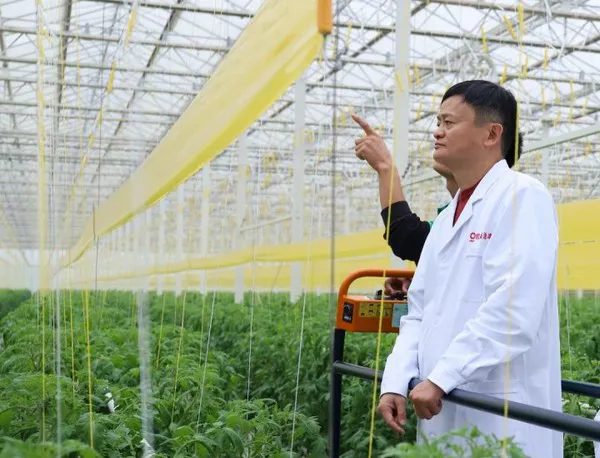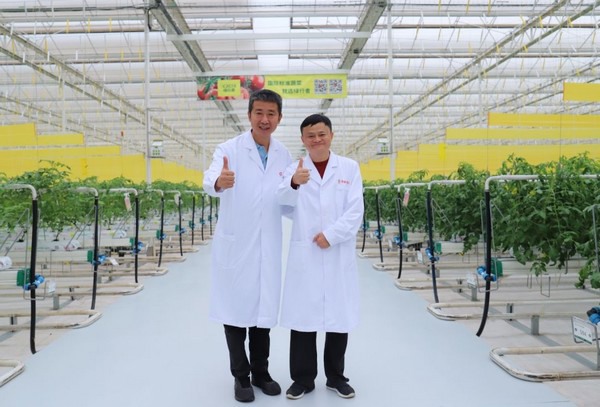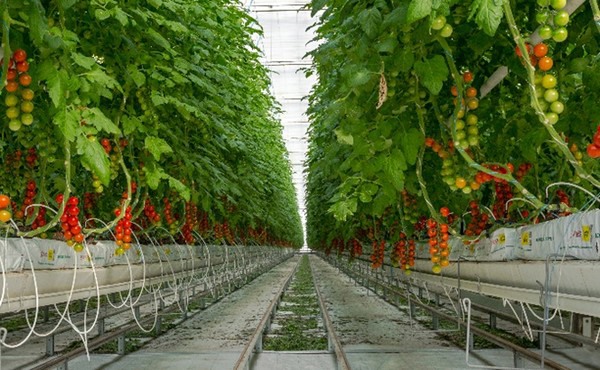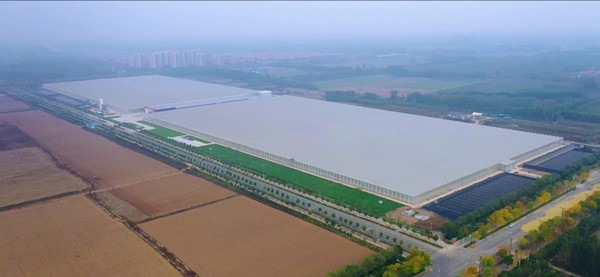It's not everyday that one of the biggest entrepreneurs of the world enters a greenhouse and when Jack Ma did, there for sure was a lot of attention for it. No wonder - according to Mr Ma, the Chinese horticultural industry is in a similar stage as the internet was in 2002. Doesn't that sound promising?
"There are developments that turn the industry upside down. There is enormous potential for growth in this industry, but only if the industry pays attention to skill and technology", he said during his visit. Jack Ma also expressed hope to explore various possibilities in the industry together with Kaisheng Haofeng, the Dezhou greenhouse company that he visited, and to promote innovation in the agricultural industry and in Chinese society as a whole.

Mr. Jack Ma visits the production service area at Kaisheng Haofeng
Mr. Jack Ma visited Kaisheng Haofeng to inspect progress
So what's the origin of the visit? That's because Ma Tiemin, a board member of the greenhouse company Kaisheng Haofeng (Dezhou) took classes at the Hupan University, which was founded by Jack Ma. When Ma Tiemin finished his dissertation on the high-tech greenhouse industry, it attracted attention of teachers at the university, and of Jack Ma. Following a discussion on the industry, they made an appointment to visit the greenhouse in Dezhou.
And he wasn't alone. Mr. Jack Ma was joined by the CEO of Sunac, the founder of YF Capital, the CEO of Alibaba Health, the director of Alibaba Cloud AI, the vice-chairman of Alibaba Group, and the deputy secretary of the Alibaba Group Party Committee. They were met by specialists from various fields so that they all could see the importance Alibaba attaches to the horticultural industry and the development potential of this industry.
AI Greenhouse
As you can imagine from a tech giant, the team paid particular attention to the technique in the greenhouse and to the processing area. He listened to relevant specialists explain about techniques like the automated internal transport system, the color analysis of tomatoes, introduction on coco coir, drip irrigation and use of fertilizers. He paid a lot a lot of attention to the details of the automated packaging line and how the climate controll is automated.

Kaisheng Haofeng CEO Mr. Ma Tiemin (left) and Alibaba founder Mr. Jack Ma (right)
Agricultural production is not focused on business, but on production
Answering to the comparisation with the internet back in 2002, Mr. Ma Tiemin shared some of the challenges the horticultural industry currently faces. "First, although many companies currently import innovative equipment and technology from abroad, most of the high-tech installations are either for show or for research. There aren't many high-tech production facilities. There have been significant changes in the industry, but there is still a long way to go when it comes to data-driven production."
Overseas suppliers
"Second, Chinese companies do not integrate well with overseas suppliers", he explained. "Some suppliers are completely focused on sales and not willing to help their clients optimize production. In addition, some Chinese companies blindly select overseas suppliers. They only pay attention to innovative technology and do not consider the type of greenhouse or the characteristics of specific installations. They construct greenhouses in unsuitable locations and do not adjust to specific environmental characteristics. That is why the production volume does not meet the expectations. This is a common problem in Chinese horticulture. Agricultural production should be about the smallest investment for the largest production volume while guaranteeing stable production", he said.
Support of growers
For a third challenge he pointed out that at Kaisheng Haofeng, before the purchase of new equipment was considered, the supplier invited several Dutch growers to give company employees an introduction to the equipment and train them in its use. "However, there is still not enough attention to science and data during the production process", he said and added that he hopes that in the future company employees can benefit from the experience of foreign growers with data-driven production, and share this knowledge with local teams.
Cities versus rural areas
As a fourth, another problem in the Chinese horticultural industry is the division between urban and rural. "The horticultural installations in or nearby cities are advanced, and the same goes for the availability of workers and managers, but the situation in rural production areas still lags behind", he explained. "Most of the young people with advanced knowledge of technology end up in high-end greenhouses and they are not eager to support farmers in the fields. That is why the division between urban greenhouses and rural production areas continues to grow wider."
According to Mr. Ma Tiemin, the best approach is to implement experimental and established technologies under controllable conditions in rural production areas to improve the production volume and so spread the advantages of high-tech agriculture to even more consumers.

Tomato plants at Kaisheng Haofeng
The goal is to optimize agricultural production
"China is huge and varied, and stretches across numerous climate zones. Many regions are unsuitable for agricultural production. However, greenhouse technology can provide a degree of control over production parameters and create a micro-climate. That is why greenhouse technology is an excellent solution in regions unsuitable for agricultural production", he said. "However, we should not focus all our attention on greenhouse technology. Open field agriculture deserves equal attention."
As Mr. Jack Ma emphasized during the press conference, the development of China's agriculture requires data-driven solutions. "And this data-driven approach does not just apply to production, but can also perform a valuable function in the supply chain," said Mr. Ma Tiemin.
"We at Kaisheng Haofeng hope to develop a 'model for data-driven agriculture' and share it with agricultural cooperations the kind of data-driven, automated technology that we have tested and verified in our greenhouses. We also hope to connect them with online retail markets to integrate and standardize the entire supply chain from plantation and harvest to packaging and distribution, all the way to the table of the consumer. Our AI system can help consumers track and trace their products during every step of the supply chain," said Mr. Ma Tiemin. "We also hope to work closely together with similar-minded colleagues in the industry and discuss production with optimization in mind."

The greenhouse managed by Kaisheng Haofeng
For more information:
Ma Tiejun - CEO
Kaisheng Haofeng (Dezhou) AI Agriculture Co., Ltd.
Tel.: +86 18053232777
E-mail: [email protected]
